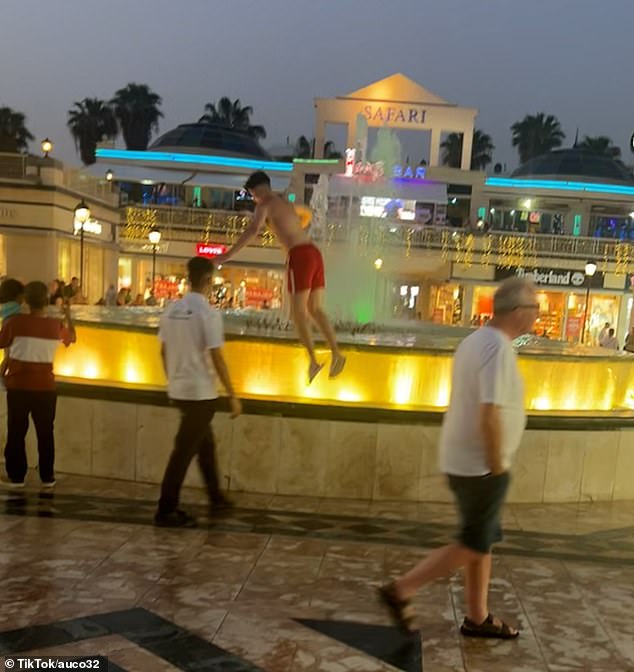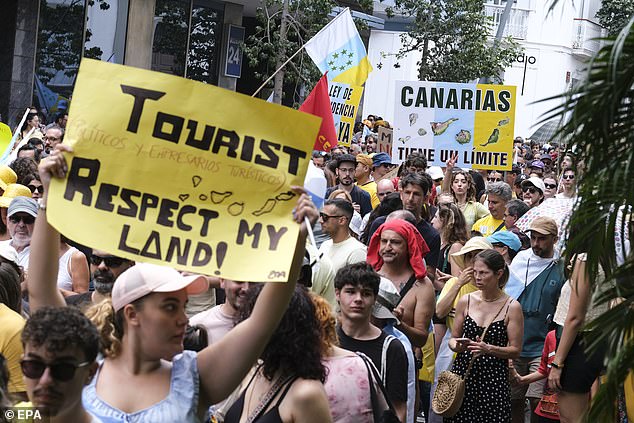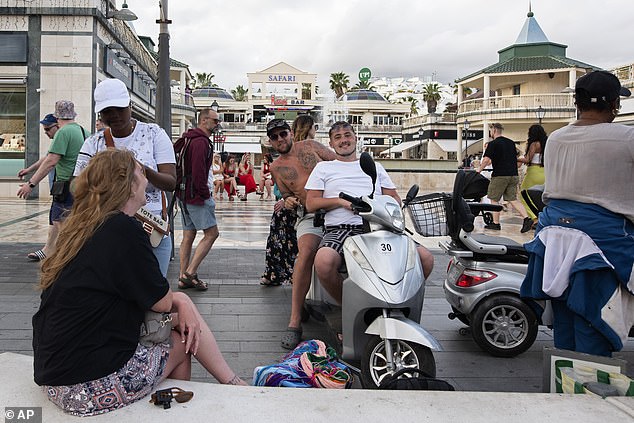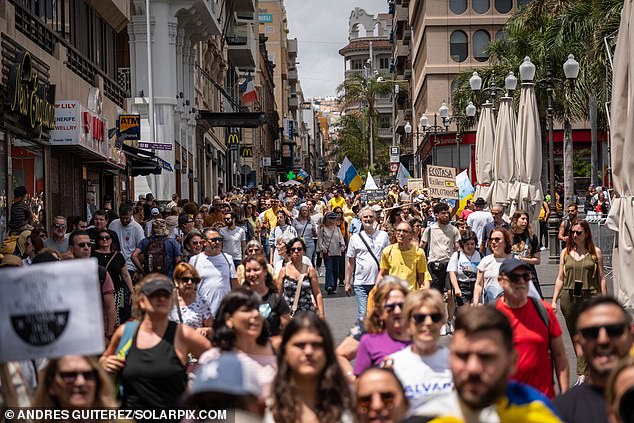The moment a British tourist is dragged away after jumping into a fountain in Tenerife for a £20 bet – as anti-tourism groups say he is the latest example of problematic holidaymakers
This is the moment a British tourist was dragged away after jumping into a public fountain in Tenerife as part of a £20 bet, with anti-tourism groups calling him yet another example of problematic holidaymakers.
Footage of the incident, which took place at the Fountain of the Americas, located in the Safari Centre in the south of Tenerife, was uploaded to TikTok by the young man’s friends after he dived head first into the water.
The video shows a shirtless man, dressed in red swimming trunks and white flip-flops, preparing for the bizarre act, while his friend holds a 20 euro note in front of his face.
He takes the note with a surprised look and then hands it back to his friend, along with his sunglasses, before running to the fountain in front of astonished bystanders.
The man runs across the tiled floor, past a number of wandering tourists, toward the glowing fountain surrounded by golden lights.
A young British tourist was filmed diving headfirst into the Fountain of the Americas in southern Tenerife to secure a £20 bet

He jumped from the edge of the water feature into the fountain before being dragged away by a staff member and then by a security guard
As soon as he reaches the edge of the water, he jumps onto the edge and dives head first into the fountain, then slams his body into the water, creating a big splash.
The photo shows a worker standing at the edge, turning his head as he is hit by the flying water. The man’s friends laugh in the background.
The young man emerges from the fountain and raises his arms in the air to show a momentary sense of victory. Until the employee grabs his arm and pulls him over the edge.
A guard then approaches the pair and we see him lead the man away before the clip ends.
The footage has angered local Canarians, who have criticised the holidaymakers’ actions, calling him disrespectful and saying he is “painting an image of tourism that Tenerife does not want”, according to Canary Weekly.
It was only two weeks ago that angry locals, who had protested against tourism in the Canary Islands earlier this year, issued a warning to British travellers, who wanted to focus on ‘key holiday areas’ during the summer period.
On April 20, tens of thousands of people took to the streets in Tenerife. An estimated 200,000 protesters took part in mass demonstrations on the archipelago.
Before these demonstrations, six men and women went on hunger strike for a period of ten days, until April 20.
Campaigners claim that the huge influx of tourists to the island is causing environmental damage, driving down wages and forcing locals out of cheap, affordable housing, with dozens forced to live in tents and cars instead.
A female protester at the march in April held up a sign that read: ‘Fourteen million tourists a year, but 36 percent of the Canarian population is at risk of poverty.’
Female protesters have previously reported being harassed and threatened by tourists and no longer feeling ‘safe’ in their home country as the streets were flooded with drunk and debauched foreigners.
“I wouldn’t go to the south of the island alone, it’s not safe for young women,” one protester told the Express.
An estimated 50,000 citizens took to the streets of Tenerife in April to protest against the problems caused by mass tourism and to demand that politicians take action.

Thousands of people demonstrate against tourism policies on the island of Tenerife, Canary Islands, Spain on April 20, 2024

Residents of the Canary Islands are protesting and demanding a review of the archipelago’s tourism policy

Canary Islanders say growth in holiday rentals is driving locals out of the housing market

The huge crowd gathered with banners, including one that read: “You enjoy, we suffer” in English
On April 20, just before noon, demonstrators gathered in Weyler Square in Santa Cruz, the capital of Tenerife. They were the starting point of a march on the popular British holiday island. They carried banners with the text: ‘You enjoy, we suffer’ in English.
But the massive anti-tourism campaign won’t stop in Tenerife, as unions have called for a massive turnout at Sunday’s planned anti-tourism march in Mallorca, the Mallorca Daily Bulletin.
The Secretary of Social Policies and Equality of the General Workers’ Union, Xisca Gari, said: “In the Balearic Islands everything is improving, except the quality of life,” while criticising the increase in the number of tourists, the number of flights and unemployment.
She criticised the fact that ‘the entire rental offer is aimed at visitors’, as residents of Mallorca struggle to find an apartment to live in ‘due to the high prices caused by ‘tourism”.
Three unions have called on workers from the sunny islands to take part in a major demonstration on Sunday.
On July 17, it was also announced that cruise ships may boycott popular destinations in Spain such as Mallorca and Ibiza if anti-tourism protests and “violent attitudes” towards holidaymakers continue to increase.
The warning was issued by leaders of the Cruise Lines International Association, who say there are many other ports around the world willing to welcome tourists without protest.
“Touristophobia is not only a problem in Spain, but also in France and other Mediterranean countries. Moreover, visitors are increasingly sensitive to it and the violent attitudes we see in cities like Barcelona have consequences for the reputation of the destination,” said Marie Caroline Laurent, European Director of CLIA, during a visit to Madrid.
Alfredo Serrano, director of CLIA in Spain, said there are countries like Saudi Arabia and others in the region that are “investing millions of dollars” to boost their tourism sector and welcome tourists with open arms.
“For example, since the dialogue with the Barcelona City Council is complicated, this will result in cancellations and dissatisfaction among tourists,” the two representatives said at a press conference.
They called on authorities to stop ‘demonising’ tourism and to run cities more efficiently.
